Report of the 58th Annual ACL Institute Albuquerque, NM, June 24-26, 2005
by Ginny Anderson, instructor
Balloons weren't the only thing flying high over beautiful Albuquerque, New Mexico, last June when an international assemblage of Classics educators at all levels descended on the University of New Mexico for three days of presentations, speeches, demonstrations, and excitement at the 58th Annual National Convention of the American Classical League, called "The Institute."
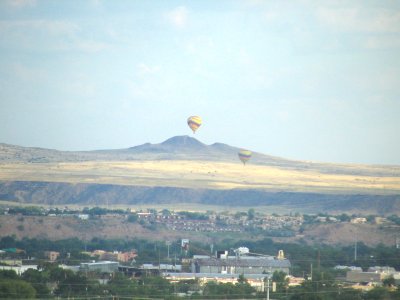
Our Senior Classics Project was honored to be included in the heady list of presenters headquartered on the picturesque campus.
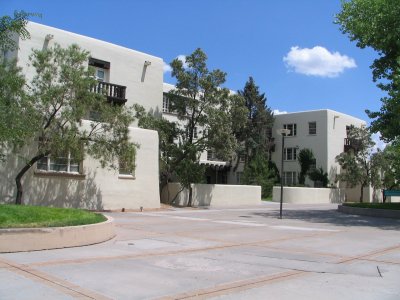
Even the central sculpture court was intriguing with life size bronze figures, which more than one person mistook for the real thing! It was easy to get lost, such a huge and beautiful campus.
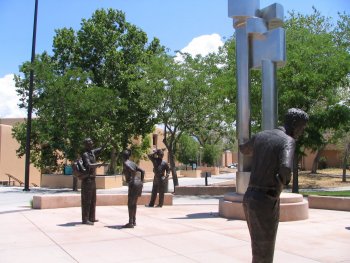
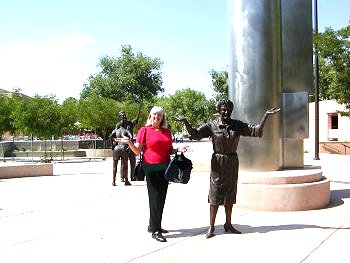
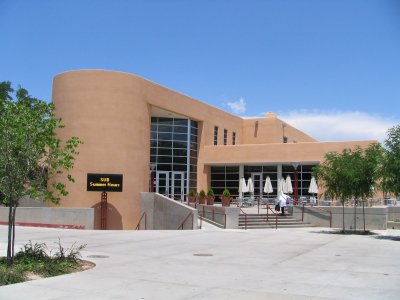
The Student Union was our headquarters for the three days of meetings, which took place all over the campus, which gave everybody present the opportunity to hear new directions, famous classicists, exciting new information and ideas in the field of Classical Languages.
Everybody left the National Conference with lots of new things to think about!
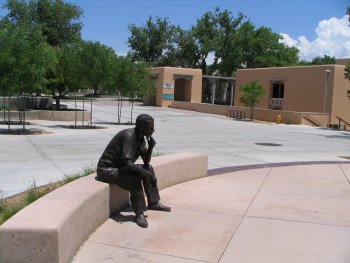
Our presentation was in a wonderful time slot, on Saturday morning at 10:00. We prepared for the event by bringing brochures, which we left in the huge display room in the Student Union, right next door to our huge room.
Our presentation was on a paper that we prepared collaboratively from our experience in our Senior Classics Project. It fell under the "Theme: New Directions in Latin Pedagogy for the 21st-Century," and was warmly and supportively received by the Classical Community. The description that we submitted was It's Not Your Mother's Latin, or Is It?
"Learning Latin is a dream come true. I didn't get to take it in school." "Latin for Every Student" took on new meaning in 2004 when three retired Latin teachers began a pilot project teaching Latin online to a new generation of Latin students: 420 senior citizens from 8 countries on the Internet. Adapting 70-year-old methodology and Latin pedagogy for 70 years olds in authentic virtual internet classrooms was a challenging and unexpectedly rewarding experience. The value and importance of this group's involvement in Latin study will be substantive and profound.
The night before our presentation we attended a splendid workshop on " Make the Internet Work for You: Putting Exercises and Quizzes Online" done by Michael A. Posey, Collegiate School, Richmond, Virginia.
At the beginning of the workshop, which was attended by about 60 Classicists at all levels, Michael asked how we used the internet in our classrooms. We were the last ones to be asked and upon hearing what we were doing the entire room erupted in applause, most unexpected and heartwarming.
Saturday morning for our presentation dawned a beautiful day but the room, one of the main conference rooms, proved to be GIGANTIC, and endowed with such sophisticated lights that nobody could work them!! William Mayer, Hunter College (CUNY), New York, who presided over the session, was most helpful in getting them to work.
We were in a wonderful group, which began with Judith de Luce, Miami University, Oxford, Ohio, who spoke on De Amicitia in the Latin Classroom, a splendid presentation, and The Concept of Friendship in Cicero by Dr. de Luce.
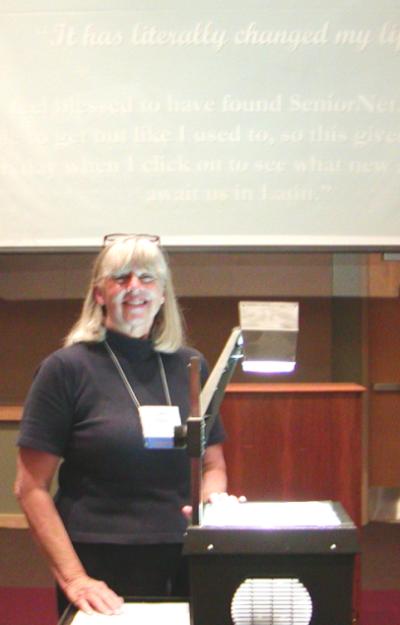
Then we were next up. We showed PowerPoint visuals of our students and their actual work, scenes from the virtual classrooms and examples of their synopses and round robin exercises and games, and explained how we were, collaboratively, presenting real Latin instruction by real teachers pro bono online in the closest thing we can get to real classes five days a week, to our newest audience in Classics: the Senior Citizen on the Internet. When we described what this meant and will mean for the field, the reaction was wonderful and exhilarating. Surely this is the most supportive field of educators anywhere on earth.
We were followed by James Morwood from the UK, who is not only the author of the Oxford Latin Course but the Oxford Latin Dictionary. His splendid talk was on Glad to be A(sexual), entitled: "While Hippolytus by Euripides ends in the masculine world of Theseus and his son, it also very conspicuously builds up a rounded picture of a women's world."
Dr. Morwood referred, in a nod to our talk, to the Senior as a focus becoming more and more important in the UK, and Dr. de Luce also expressed her own interest is in the senior, I have a feeling there will be a lot more programs aimed at this wonderful age group.
Then the session concluded with Scott Hadley, Benemerita Universidad Autonoma, Puebla, Mexico who spoke on "The Importance of Latin for Building Specialized Spanish-English Vocabulary" and who later won an award.
After the talks we were surrounded by people who wanted to talk about our program and who wanted to hear more. Dr. Mayer came by and got a handful of brochures, saying that he thought people needed to know about this! Several people also came up after this presentation and talked more, there was quite a crowd for us, and the Evaluations returned were out of this world. I was quite proud of our effort and also proud of the wonderful reception we received.
Throughout the four days, attendees were treated to scores of important and innovative presentations, culminating in a Dramatic Reading of Plautus' "Mostellaria" by the students of the University of New Mexico, and a wonderful final banquet accompanied by the results of the Gregorian Chant workshop.
You could not have asked for anything more, and we were proud to be in that number, to be so warmly received at this prestigious convention, to be representing our Senior Classics Project Students and Team, and to be part of that exciting happening in Classics. People referred to it throughout, including at the last banquet where those sitting with us knew about it and this year for the 2006 ACL "Institute" at the University of Pennsylvania in Philadelphia, June 23-26, the "Senior" is listed also in the first of several Themes for the 2006 Institute:
Teaching Latin to Non-Traditional Students/Audiences
In the short year since we attended this National Conference, our program has grown and expanded. We now offer two levels of Greek Instruction online, and a Classics Newsletter. We have also taken the Instruction of Latin for Seniors to in-person classes at Furman University and now offer two levels of Latin at Furman's FULIR Program (Furman University Learning in Retirement).
We encourage all those interested in Classics in any form to attend any of the National Institutes when they come to your area or State meetings: we all come away enriched, inspired and encouraged.
Balloons weren't the only thing flying high over beautiful Albuquerque, New Mexico, last June when an international assemblage of Classics educators at all levels descended on the University of New Mexico for three days of presentations, speeches, demonstrations, and excitement at the 58th Annual National Convention of the American Classical League, called "The Institute."

Our Senior Classics Project was honored to be included in the heady list of presenters headquartered on the picturesque campus.

Even the central sculpture court was intriguing with life size bronze figures, which more than one person mistook for the real thing! It was easy to get lost, such a huge and beautiful campus.



The Student Union was our headquarters for the three days of meetings, which took place all over the campus, which gave everybody present the opportunity to hear new directions, famous classicists, exciting new information and ideas in the field of Classical Languages.
Everybody left the National Conference with lots of new things to think about!

Our presentation was in a wonderful time slot, on Saturday morning at 10:00. We prepared for the event by bringing brochures, which we left in the huge display room in the Student Union, right next door to our huge room.
Our presentation was on a paper that we prepared collaboratively from our experience in our Senior Classics Project. It fell under the "Theme: New Directions in Latin Pedagogy for the 21st-Century," and was warmly and supportively received by the Classical Community. The description that we submitted was It's Not Your Mother's Latin, or Is It?
"Learning Latin is a dream come true. I didn't get to take it in school." "Latin for Every Student" took on new meaning in 2004 when three retired Latin teachers began a pilot project teaching Latin online to a new generation of Latin students: 420 senior citizens from 8 countries on the Internet. Adapting 70-year-old methodology and Latin pedagogy for 70 years olds in authentic virtual internet classrooms was a challenging and unexpectedly rewarding experience. The value and importance of this group's involvement in Latin study will be substantive and profound.
The night before our presentation we attended a splendid workshop on " Make the Internet Work for You: Putting Exercises and Quizzes Online" done by Michael A. Posey, Collegiate School, Richmond, Virginia.
At the beginning of the workshop, which was attended by about 60 Classicists at all levels, Michael asked how we used the internet in our classrooms. We were the last ones to be asked and upon hearing what we were doing the entire room erupted in applause, most unexpected and heartwarming.
Saturday morning for our presentation dawned a beautiful day but the room, one of the main conference rooms, proved to be GIGANTIC, and endowed with such sophisticated lights that nobody could work them!! William Mayer, Hunter College (CUNY), New York, who presided over the session, was most helpful in getting them to work.
We were in a wonderful group, which began with Judith de Luce, Miami University, Oxford, Ohio, who spoke on De Amicitia in the Latin Classroom, a splendid presentation, and The Concept of Friendship in Cicero by Dr. de Luce.

Then we were next up. We showed PowerPoint visuals of our students and their actual work, scenes from the virtual classrooms and examples of their synopses and round robin exercises and games, and explained how we were, collaboratively, presenting real Latin instruction by real teachers pro bono online in the closest thing we can get to real classes five days a week, to our newest audience in Classics: the Senior Citizen on the Internet. When we described what this meant and will mean for the field, the reaction was wonderful and exhilarating. Surely this is the most supportive field of educators anywhere on earth.
We were followed by James Morwood from the UK, who is not only the author of the Oxford Latin Course but the Oxford Latin Dictionary. His splendid talk was on Glad to be A(sexual), entitled: "While Hippolytus by Euripides ends in the masculine world of Theseus and his son, it also very conspicuously builds up a rounded picture of a women's world."
Dr. Morwood referred, in a nod to our talk, to the Senior as a focus becoming more and more important in the UK, and Dr. de Luce also expressed her own interest is in the senior, I have a feeling there will be a lot more programs aimed at this wonderful age group.
Then the session concluded with Scott Hadley, Benemerita Universidad Autonoma, Puebla, Mexico who spoke on "The Importance of Latin for Building Specialized Spanish-English Vocabulary" and who later won an award.
After the talks we were surrounded by people who wanted to talk about our program and who wanted to hear more. Dr. Mayer came by and got a handful of brochures, saying that he thought people needed to know about this! Several people also came up after this presentation and talked more, there was quite a crowd for us, and the Evaluations returned were out of this world. I was quite proud of our effort and also proud of the wonderful reception we received.
Throughout the four days, attendees were treated to scores of important and innovative presentations, culminating in a Dramatic Reading of Plautus' "Mostellaria" by the students of the University of New Mexico, and a wonderful final banquet accompanied by the results of the Gregorian Chant workshop.
You could not have asked for anything more, and we were proud to be in that number, to be so warmly received at this prestigious convention, to be representing our Senior Classics Project Students and Team, and to be part of that exciting happening in Classics. People referred to it throughout, including at the last banquet where those sitting with us knew about it and this year for the 2006 ACL "Institute" at the University of Pennsylvania in Philadelphia, June 23-26, the "Senior" is listed also in the first of several Themes for the 2006 Institute:
Teaching Latin to Non-Traditional Students/Audiences
The profile of Latin students in the 21st century is, in many ways, different from that of Latin students at the beginning of the 20th century. Latin teachers must constantly reevaluate the way they teach and must find different and effective ways to reach these students. This theme includes pedagogical approaches for teaching students K through college from a variety of backgrounds and learning abilities. It also challenges Latin teachers to think about ways to reach out to other constituencies including the home-schooled, community college students, and senior citizens.
In the short year since we attended this National Conference, our program has grown and expanded. We now offer two levels of Greek Instruction online, and a Classics Newsletter. We have also taken the Instruction of Latin for Seniors to in-person classes at Furman University and now offer two levels of Latin at Furman's FULIR Program (Furman University Learning in Retirement).
We encourage all those interested in Classics in any form to attend any of the National Institutes when they come to your area or State meetings: we all come away enriched, inspired and encouraged.